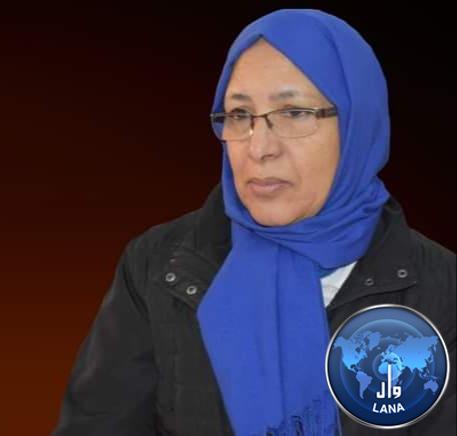Lana cultural editor talks to Libyan writer Aisha Bazama about her novel The ‘Hashish Market’.
Pulbished on:
Benghazi, 26 February 2022 (Lana) Libyan writer and storyteller Aisha Ahmed Bazama revealed the first part of her novel "The Hashish Market", which bore the name "Oreida." The novel which bore the name of one of the neighborhoods of the old city of Benghazi examines the social corners, cultural figures, artistic names and sports stars who lived in the area of the hashish market.
In her interview with the Lana cultural editor quoted the writer Aisha Bazama as saying she wrote this novel inspired by her childhood in the neighborhood of "Souq Al-Hashish", which is in the heart of the old city of Benghazi, witnessed the contemporary periods of memory of the city, and was the most tender and vocal of the old neighborhood.
Bazama explained that the name of the first part of this novel, which was named "Orida" was not in vain, this name was one of the most widely circulated names in that neighborhood and to make it appeal to the reader the author chose the name where it tells the realistic story of one of the girls of that street in the 1950s until the end of the 1960s mimics the reality of the city and its neighborhoods and alleys and moved us to a time the city lived in the middle of the last century.
On the second and third parts of the novel, the writer continued that the second part of the novel will be named (King and Sheikh), while the third part will carry the name (Apple Street), stressing that it seeks, if given the opportunity, to reach five parts of this novel so that it can highlight all corners (Hashish Market) and cover it to satisfy the reader's insatiable interest.
With regard to the characters covered in the novel, the writer Bazama included personalities of cultural, artistic and literary weight who lived and grew up in the alleys and streets of this neighborhood, including but not limited to the late Libyan writer Al Sadiq Al-Nihom, Libyan artist Ali Al-Shaaliya and Libyan poet Ali Al-Fazani and radio anchor Mohammed Al-Mutamati, as she addressed in the first part her father, Professor Ahmed Bazama, a veteran of the educational institution in Libya.
It is noteworthy that this novel was addressed critically by a number of Libyan and Arab writers, including the writer Younis Al-Fanadi and the interviewer Bashir Balao. The Iraqi poet Karim Abdullah wrote about it, in addition to a written commentary from the Tunisian writer Asma al-Sebawi, the Tunisian writer "Mohamed Al-Mutaqi" and the Jordanian writer "Nizar Sotoai" and currently it is being tackled with criticism and translation by Mohamed Al-Najmi.
=Lana=




